Paul Alkazraji's Blog, page 3
August 12, 2021
‘Albania ‘96: sweet, sad, surreal...’ Book review by Paul Alkazraji.
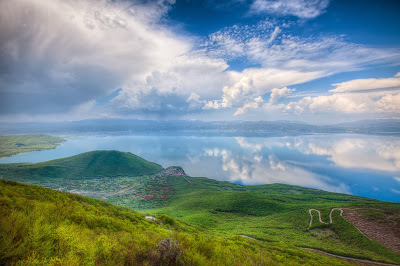
Lake Pogradec by the ‘not quite so accursed mountains’ of south east Albania, scene of the now famous ‘fish restaurant stitch-up' incident. Pic. A. LaSavio.
In the pocket of his increasingly tatty travel trousers Robert Carver carried an impressive business card during his 1996 passage through Albania: it said ‘Freelance BBC Broadcaster - author - film-maker’ (in 7 languages) to establish his credentials where necessary. ‘The Accursed Mountains’ is his fabulous account of the country post-communism and pre-anarchy of 1997. It is a personal travelogue with rich seams of the land’s history running through it.
Having lived in Albania myself for a decade, it is with some self-reproach that I took so long to arrive at reading it. Carver’s observations are highly insightful about the culture, funny and at times painfully déjà vu to read, like how, as a foreigner, he got financially skinned at a fish restaurant on Lake Pogradec... poor man. He writes poignantly of one refugee being evicted off a bus near Leskovik and left at the roadside ‘staring at us as if at a passing lifeboat in mid-Atlantic’. He records a Greek taxi-driver’s description of Albania as: “...just like Greece used to be after the civil war. No cars, much poverty, broken houses, donkeys and mules, no work, but... but...”
“...a sweetness?” suggests Carver.
“Yes, a sweetness,” the driver replies. He writes of the whole place resembling the post-war Italy of Vittorio De Sica’s film ‘Bicycle Thieves’, and of the surreal aspects of ‘90s Albania: a brown bear chained up outside a gynaecological clinic in Tirana, and the broken neon lights of ‘Ali Pasha’s Disco-Boogie Club’.
Though at times what he records strikes a relentlessly bleak, even brutal tone, it is nevertheless not unfair: the cruelty in the country’s past; the tragedy in its present; the ruined, shabbiness of everything then were so. Albanians, though, are given occasional voices for a reverse assessment. One woman says of Britain after she had just holidayed there: “Very clean, very rich. But there is no family life and everyone works so much, all the time. And the women are hard, like men, and the men are soft, like women. In England the women are beating the men, I think,” she says. His respect for the missionaries who helped him around the remoter north comes through, despite the insinuation that two of them in Bajram Curri, ‘the Dodge City’ of northern Albania, were probably CIA agents.
The postscript ‘where are they now’ raises an ache to know that the cast of characters Carver met were okay, that they made it out of the ensuing chaos of ’97 alive. Some of them didn’t. His mountain guide, Major-Doctor Bajraktar, was ambushed and murdered whilst gun-running for the KLA. And what really happened to ‘Natasha of the nomenclature’ in the UK? It was with some delight that one central character was discretely pointed out to me, alive and well in August 2013, just a few feet away in a crowd. “No... it can’t be him... is it really?” I said. “Yes,” my confidant assured me, “That’s him.”
This is a vivid and perceptive travel narrative from an erudite writer who wowed me with his capacity to repeatedly nail things so well. It holds its own with the works he refers to, Edith Durham’s ‘High Albania’ and Julian Amery’s ‘Sons of the Eagle’, on the top shelf of British sojourners in the country.
The Accursed Mountains: Journeys in Albania
A book by the reviewer set in Albania:

Published on August 12, 2021 08:43
•
Tags:
albania, bajram-curri, gjirokastër, korçë, ohrid-lake, pogradec-lake, tirana
June 10, 2021
Q and A with author Paul Alkazraji
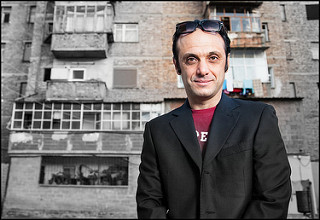
‘The Silencer’ – Turmoil in Turkey and a ‘lone wolf’ who sets out across the Balkans for a strike on a foreign target…
What inspired you to write this story?
I’d had the idea of writing a thriller with a ‘slowly approaching danger’ for some years, but when I read into recent incidents of the persecution of the church in the nearby country of Turkey, it anchored the story in that context more. I began to feel in a new way that there were people not dissimilar to myself close by facing grave dangers. The book gives some account of events there, but I think it is a story that could have come similarly from numerous other countries too. Then I set about looking at how the main character and others around him might deal with facing such frightening realities emotionally and spiritually.
Where does the story begin?
The opening scene on a taxi van (a ‘furgon’) coming over the spectacular Qafë Krrabë road, which climbs into the mountains south of Tirana, Albania, was the first piece of the story I had in place in my head. It is a thrilling route to travel, but preferably in safe driving hands. The manner of driving in the scene is not exaggerated for effect and I’m not alone in having been through some of those white-knuckle experiences written for the protagonist Jude. Though, to be fair I think the general physical condition of many ‘furgons’ has improved in recent years... if not the driving.
What are its themes?
Justice is a main theme of the story, and how when people prosecute their own notions of it, how wide of the mark that frequently falls. In one scene before Jude leads a discussion in class about justice in the French Revolution, two neighbours argue in a nearby apartment block, and one throws dirty water down, but it falls on passers-by, and this is how it is. In the story the Leeds United FC fans’ vengeance catches Sheref, who is not even Galatasaray, he’s Fenerbace... and Sheref’s vengeance falls... well, you’ll need to read it to find out.
Did you make the antagonist’s journey?
Yes, but during the field research I discovered that the ‘Friendship Express’ service between Istanbul and Thessaloniki had stopped altogether just a month before I wanted to get on it. So I had to work out an alternative way of experiencing the journey Sheref makes. My wife and I found a coach trip for Istanbul from Albania on Women’s Day 2011, and travelled roughly along the same route through the night, at times parallel to the railway lines. The excursion degenerated into chaos in Istanbul as the passengers complained and demanded their own personal itineraries be met, and the organisers, who had had enough of them, dumped them all in fatigue. Caught in the middle of it, we ended up locked inside the coach for over two hours. But that said, I was still able to do what I had set out to. I would have loved to have taken the train. As an aside, it is the first section of the route James Bond travels with Tatiana Romanova and the ‘Spectre’ machine in Fleming’s ‘From Russia with Love’.
Are some of characters based on real people?
There are shades of people that I have met and known, but no real people wholesale: they are imaginary concoctions. Though, that said, Jack and Flori Moshohori, the Albanian border guard, come close. The back-story of hard-man Mehmed Krasnichi is loosely-based on the life of someone I have met in Albania, though it is not a true telling of it. It has fictional additions and elaborations, a different physical description, and shouldn’t be taken as accurate at all. In common with other writers, many of the characters are given names that fit them. To mention a few, the goatherd boy in Jude’s class, ‘Liridon’ means, ‘longing for freedom’, and the Turks ‘Gazi’ which means ‘wounded veteran’, and centrally, ‘Sheref Dushman’, which means ‘honour/pride’: ‘the enemy’. There was an Albanian tribe by the name of ‘Dushman’ too.
Have you a favourite minor character?
The minor player of Defrim, a driver with an excess of gizmos on his dashboard, typifies those surprising connections you can find with people when you are travelling. In the back of beyond, you chance upon someone with whom you share absurd things in common. In this instance Defrim is an improbable enthusiast for the 80’s synth-pop act ‘The Human League’. He is also someone for whom Providence has a role in a greater story unfolding all around him.
Where did you learn about the pistol in the epilogue?
Among the many tiles that were brainstormed for the book was ‘The Tokarev Falls’, the reason for which I think is apparent in the epilogue. The operation of the Tokarev TT pistol, standard Albanian Police issue, is correctly described there, and was shown to me by a relative who is licensed to hold one. He dismantled his quickly and set the oily pieces out on my desk inviting me to reassemble it, and I stared blankly at it. He then quickly clipped it all back together, waved it under my nose, and offered it to me to handle. He left me three copper-coloured bullets in my pencil holder as souvenirs.
Can we guess the ending?
I hope that as the plot unfolds there is a sense of events not being pre-determined, and of how in the midst them outcomes can turn on prayer.
Video trailer on vimeo: https://vimeo.com/51611355
Amazon UK reviews: http://www.amazon.co.uk/The-Silencer-...

Published on June 10, 2021 09:04
•
Tags:
adventure, albania, christian, england, greece, istanbul, mission, persecution, suspense, the-church, thessaloniki, thriller, tirana, travel, turkey
May 7, 2021
Songs only spoken
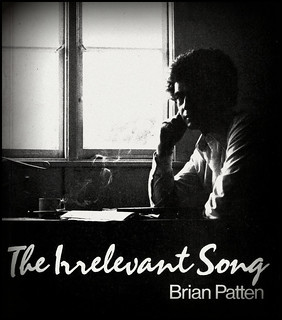
Once upon a season, long-gone and vaguely remembered, these poems awakened something creative in me. I wanted to write words like these too: free flowing but with refrains, as the words of songs, accessible but closer to the poet’s craft. And so I did.
Brian Patten’s ‘The Irrelevant Song’ is full of odes to love’s replete and transient moments, so keenly felt and wistful, like these:
‘I met her early in the evening
The cars were going home
I was twenty-four and dreaming…
When the street railings were burning.’
And: ‘I caught a train that passed the town where you lived…
One evening when the park was soaking
You hid beneath trees, and all around you dimmed itself
as if the earth were lit by gaslight.’
As if one of Patten’s park gates swung open before me, I entered then a world I’m still a part of some thirty-five years later, which took me from poetry to journalism, biography and novel writing.
I didn’t read all the poems in this collection at that time. I didn’t need to. Those I read chimed so well with my student mood that I was moved to begin. Thank you Mr Patten. Still lovely words… and a very relevant song.
---
From my first collection of poems
‘Little Pieces of Writing’ (1986).
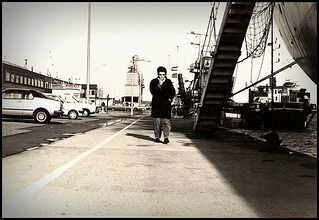
I saw a photograph
I saw a photograph of you
in someone else’s album
I’d forgotten that it had ever
been taken
I thought about it for most of that day
and the following one
We were sat on a rock in Wales
We were both smiling
It was taken last August
yet it seemed like
both yesterday and ten years ago
Other people just flicked past it
I saw a photograph of you
in someone else’s album
Suburban Dog Woof
When twilight is descending
And daylight is retreating
When children pretend to be sleeping
Late on those long summer evenings
Above the houses
And the neon lights
In the alleys
And behind closed gates
Always in the distance
The suburban dog woof
Breaks the silence
By this writer:

March 11, 2021
The Soldier and The Monk’s Tale
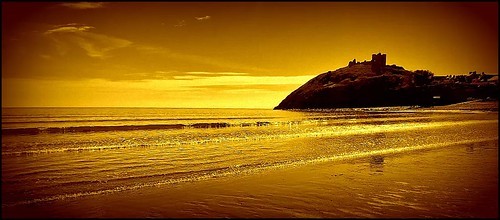
A wounded soldier of fortune journeys through medieval Wales towards a new beginning in ‘The Healing’. Author Joy Margetts talks to Paul Alkazraji about her new novel.

Tell us a little about your novel ‘The Healing’.
The Healing is part historical fiction and part spiritual journey. It is set in medieval Wales against the backdrop of Cistercian life, and is the story of how one man finds healing, of mind, body and soul. Philip de Braose is a man wounded by life. He finds an unusual friend and companion in a kind-hearted Cistercian monk, Brother Hywel, and together they journey back from France to his homeland in Wales. During that journey, and in his time immersed in Cistercian life, God draws Him back to Himself and gives him the grace to be able to confront and deal with his hurts and failures. Particularly through Hywel’s kind words and gentle ways, God does a redeeming work in Philip’s life and he emerges a changed man. He is ultimately able to return to his own world and become the man that God always intended him to be.
Is there an aspect of it you are particularly pleased with?
That is a hard question! I am pleased with it as a whole. I think it is a story with a gripping beginning, that moves seamlessly and engagingly to a satisfying end. But it is more than a well told tale, it is a story of healing and redemption that mirrors my own experience. As that, it is a genuine portrayal of what God can do to heal and restore any one of us. It is truthful and truth- filled, and I believe carries hope.
Share with us a sentence of your choice from the book,
‘We willed you to choose life, and you did. Now, Philip, I am urging you to choose hope. You can let the despair take you, or you can choose another way.’
Tell us about something you like or dislike in one of your characters.
I love Brother Hywel’s sense of humour and ready smile. He is kind and wise but not pious in any way. He is just a very good man… in fact one of the most Christ-like people I have ever met! And yet very relatable and human.
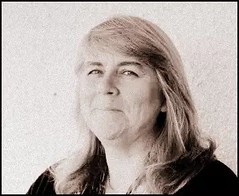
Tell us a little about yourself.
I am a fifty-something mother of two grown children, eagerly expecting my first grandchild in the spring. My husband and I live, together with a feisty Jack Russell, on the beautiful North Wales Coast, with stunning views from our home of sea and mountains. In a previous existence I was a nurse/midwife but left that to pursue other things. Local church is very important to me, and I have the privilege of being able to regularly teach the Word of God, and run our very own in house Bible Academy. I have always loved writing, but never in my wildest dreams have I ever believed that I would have a novel that I had written published.
How does your faith influence your writing?
This book really wouldn’t be here if it weren’t for my relationship with God. As I said, the message of the book is taken directly from the things I had to learn, and re-learn during a really difficult time in my life, when my health unexpectedly failed. God was so kind and gracious to me in surrounding me with friends who were like Brother Hywel to me. They prayed when I could not, spoke the truth with love, and showed me how much God cared about what I was going through, when I couldn’t hear His voice for myself. God has restored me as He did Philip, and is continuing His healing work in me. I believe The Healing is part of my redemption. I lost many things due to my illness, but bit by bit God has given back far more than was stolen from me. This book is God’s gift to me, and I have given it back to Him. I pray that it will be a gift, from God, to many others too.
Tell us about something you’ve read recently that moved you.
The Treasure Man by Joy Vee is a children’s book but with a profound message. I read it to review it but it spoke so deeply to me! It deals with two really powerful truths that the children in the story have grasped so readily: that we are really precious to God, and that we can hear His voice easily for ourselves. It moved me because as adults we can sometimes find it hard to accept those simplest of truths. We make our faith so complicated at times when God calls us to have a simple childlike faith.
What are you most thankful for in life?
Love. God’s unfathomable love for me. The constancy of the love of my (longsuffering) family and friends. The privilege of being able to share God’s love with others.
What makes you laugh?
The dog – when he is not winding me up!
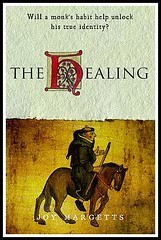
The Healing will be published by Instant Apostle on 19th March.
You can order a signed copy direct from the author at www.joymargetts.com where you will also find out more about the book, and how it came to be written, as well as some historical background.
By the interviewer:

Published on March 11, 2021 09:30
•
Tags:
christian-fiction, christianity, cistercian, france, healing, historical-fiction, medieval, monasticism, wales
February 25, 2021
'Heart of a Hooligan': Dave Jeal's story

Paul Alkazraji and Dave Jeal. Bristol, UK, Summer 2013.
Here is one of the original newspaper reports that led to the writing of the book.
From Hooligan to Holiness.
For Dave Jeal football violence had become a way of life. He talks to PAUL ALKAZRAJI about how becoming a Christian has given him a whole new set of goals.
Dave Jeal's appearance is a touch deceptive. He sports exactly the kind of haircut you would expect of someone who was, until recently, involved in the disturbing world of football violence. It comes as a revealing surprise, then, to find he had his head shorn only recently whilst working with Ark Christian Ministries amongst homeless people in South Africa.
Throughout the mid-Eighties and early Nineties Dave Jeal wore a neatly cut bob and was a 'casual', a 'boy', a member of a Bristol Rovers 'firm' know as the Young Executives. In layperson's English he was at the centre of gang fighting both at league matches and as an England Supporter during the 1990 World Cup.
"I first started going to football in 1972 when I was seven years old," he told me. "I left school at 15 and got in with a dodgy group of lads, and it just got out of hand really. It started off with us coining the away fans and things like that, then it got a bit more involved. We would get to the matches early to see where they parked their cars, and then leave early to go and wait for them. It was mindless violence."
"If Rovers were playing a Welsh club, we'd get to their town centres early, take as many liberties as we could, and try and find out where their firms' pubs were. The object was to take ground. There would be a lot of shouting, one or two punches might be thrown, and then one lot would run. It was a scary game. I've had bleach sprayed in my eyes and I lost my eye socket I've got a plastic one now. I've also got a false tooth and a broken nose. I wasn't very good at it."
Dave also travelled with rival Bristol City fans to England away matches. "During the 1990 World Cup Semi-Final we went in the German end of the stadium with the intention of unfurling our Union Jacks over the German flags, but we got marched out at gunpoint by the Italian police. On the way back to Naples they made us get off at a station where all the German fans were: 400 of them and about 30 of us. We ran into the Germans and this guy fired a flare pistol straight at me. It was bizarre. It can only have been God: it just went up and over my head."
Dave explained to me that the reality of evil impressed itself powerfully upon him during an incident in Stockholm, and it proved to be a turning point in his life. "In 1992 I went to Sweden for the European Championships. England got knocked out by Sweden and there was a full-scale riot outside the ground. I climbed a fence with another guy and got involved in a scuffle with some Swedish fans, and I started kicking one. I ran off up the road, and when I came back about 15 minutes later there were still six or seven lads kicking him on the ground. He was unconscious and he wasn't moving. It just sickened me.”
"I walked back to the stadium where we were sleeping, and I sensed this deeply evil presence all over Stockholm. It think it was because of the wickedness I had seen and had a hand in. My mum was a member of the Salvation Army and I phoned her up and asked her to pray for me. I was petrified."
Early the next day Dave began making his way towards the airport. "I was walking through a subway and there was no one else around," he told me. "Out of nowhere this Salvation Army guy came up the other way and stopped and looked at me. He smiled and nodded. He didn't say anything. It was bizarre. When I got back home I decided I would make a new start but I didn't."
Two and a half years ago, whilst volunteering at a project for Bristol's homeless run by his mother, Dave told me that he "took a shine" to a fellow helper, who invited him to her church. "I went to a service and I hated it. About 10 minutes before the end I just burst into tears. It freaked me, so I ran out to the pub and got pretty hammered. She invited me back, so I went to prove to myself it wouldn't happen again. It did, only this time I was locked in the middle of a row and 1 couldn't get out.”
"These two guys asked me if they could pray for me. I said, 'You can do what you want!' They said, 'Well, what do you want?' Then it hit me. I said 'I want all the anger and hate and pain inside me to go.' They said, 'Do you accept Jesus Christ' I said, 'All right,' and the next thing I knew I was laid out in the middle of all these chairs. I got up and I felt like this massive rucksack I had been carrying around my whole life had just been lifted off me."
Dave subsequently joined the congregation of Wood lands Road Church in Bristol. "It hasn't been easy for them or for me, because I like to call a spade a spade," he says. "I had this thing that I'm working class and I wouldn't be accepted, because most churches are middle class, but my church has been brilliant. They have given me so much support."
For the last two years Dave has helped run their youth group, and is in the process of starting up a half-way house for ex-prisoners and drug users emerging from rehabilitation, with the backing of his church. He has a warmth and gentleness which belies his history and are a testament to God's work.
I asked him how his mum had reacted to the news. "She had just got back from her holiday. I had been trying to phone her all afternoon, and I said, 'Mum I've got something to tell you.' It went really quiet. I said, 'I've become a Christian,' and she just screamed and she was crying."
Dave still attends Bristol Rovers matches, though no longer for the dark exhilaration of 'firm' membership. He still maintains old friendships, however, so I asked him how his new allegiance went down on the terraces. "They think it's hilarious," he told me with a grin.
"I went on Sunday with my girlfriend and some people from church. They were saying, 'Is this part of your new firm then?' I said 'Yes its God's firm!”
"The referee made a dodgy decision, and I was dying to shout abuse at him. They noticed and said, 'You wanted to swear then, didn't you' I said, 'Yes? They think that's brilliant, and that I'm still one of the lads. I am and I'm not, if you know what I mean."
Originally printed in the 12th June 1998 issue of the UK’s Catholic Herald.
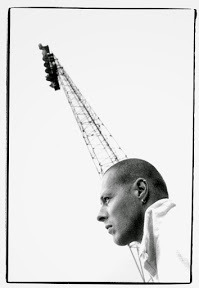
Dave Jeal, 1998.
By Paul Alkazraji.

Published on February 25, 2021 08:46
•
Tags:
bristol-rovers, christianity, church, dave-jeal, england, european-championships, football, hooliganism, jesus, juventus-fc, millwall-fc, paul-gascoigne, soccer, stockholm, turin, united-kingdom, violence, world-cup
February 4, 2021
Anthony Quayle’s cameo in ‘The Silencer’
‘The Silencer’ Excerpts from chapters 7 and 14.
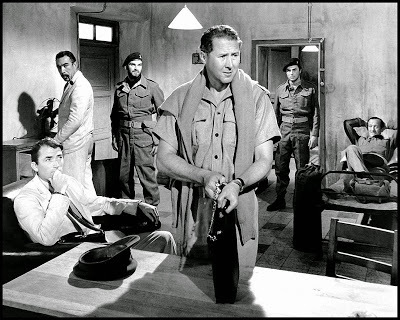
Anthony Quayle and cast in ‘The Guns of Navarone’
Shpetim’s grandfather shuffled slowly down the steps and indicated with his stick that he wanted a cushion for the chair.
“How do you like Albania?” said Skender refilling his own glass with raki.
“I like it,” said Jude. “Great weather… great dust! Expensive Mercedes cars with roads to break their suspensions on. Warm, hospitable people living in cold apartment blocks… You are a family-loving people… providing you don’t get into a disagreement with another family.” There was an outburst of hearty laughter from all at the table.
Shpetim raised his glass. “Gëzuar!” he said.
“Gëzuar!” everyone toasted, chinking the tips of glasses together.
“Luan here broke the suspension on uncle Burim’s Mercedes,” said Shpetim gesturing to his side with his thumb.
“I did not. It was the axle… and it was already defective!” protested Luan and jumped up to grab his brother in a neck-lock. The two bothers play-wrestled with each other from the table across the yard until Shpetim took hold of Luan’s leg and up-ended him. They both tumbled together into a bush cracking the branches and rolling out together covered in twigs and leaves. Everyone roared with laughter. Shpetim’s immaculate, white shirt was now soiled and the front pocket torn.
“What about England? Don’t you miss it? Great Britain! It is a high culture Jude… and we will see it together, won’t we?” said Shpetim frowning at his brother as he brushed himself down.
“We will,” said Jude. “I miss it… and I worry about it. People call light darkness there now. I don’t know… it’s as if it’s lost its compass.”
“Old Petrit here… he loved the British officers when he was a boy,” said Shpetim.
“He was a child Partisan!” said Luan standing up and saluting with a clenched fist. “Vdekje fashizmit! Death to fascism! Freedom for the people!”
“Who did you meet, xhaxhi Petrit?” said Jude, his interest pricking up.
“Dëgjo…” said Petrit putting his stick against the table edge and lifting a piece of tomato to his mouth before sucking it noisily. He was not going to be rushed; he’d been given the spotlight.
“My family is from Dukat near Vlora… not here,” he said. “The war was terrible. I remember the Italian soldiers starving… they fell down at the roadsides together with their mules and died. There were some British officers who had a base in the mountains near us… some Italians would come and buy food for them from the villagers. One time, a big plane, a Halifaks they said, came in with supplies and more British soldiers and crashed into the mountain killing everyone on it. Some of the Partisans looted it… I was angry with them. It was not right. They had come to help us fight the Nazis!” He sat upright now and a boyish pride shone through his eyes. “But I went with my father… We took some bread, cheese and dried meat, and packed it in a bag on our mule. We travelled for most of the day through the mountains and down to the sea. The sun was setting across the Adriatic… all the way to Italy. The British had a base in a cave there… we knew. There was a man I remember… who came out to meet us. He had a fat face and small eyes. He looked sick and yellow… Major Toni Kueill he was called. He gave us a gold sovereign for the food. He gave me a photo of a film star and he said, “I’m sorry it is torn.” My father gave the sovereign to me and I still have it. Later, I joined the Partisans… that is another story.”
“If it was Major Anthony Quayle, xhaxhi, you met a special man. After the war, he became a famous film actor. Did none of you ever see him on the television?” Jude looked around at the blank faces. Luan shrugged his shoulders.
“’Ice Cold in Alex’… ‘The Guns of Navarone’… ‘Lawrence of Arabia’? I’ll get copies!” said Jude. “Enver Hoxha sent Partisans after the British officers who’d helped him as the war was drawing to a close. They were just a small band of men trying to fight off an evil tyranny… as another home-grown one moved in to take its place.”
“Enver Hoxha was a killer of the Albanian people!” shouted Luan and thumped the table.
“They were almost caught, but they escaped with their lives,” said Jude. “Those that died during those special operations, we know, are buried in Tirana Park.”
“It was a fight they lost,” said Skender. “It was obscure and far from the front lines. The war was won on the beaches of Normandy.”
“It’s sometimes said… that the victory over all evil was won at Calvary,” said Jude glancing at Shpetim. “That was our D Day. But we are in the days before VE Day… when He will come again. Until then… that battle is still on.”
From Chapter 14.
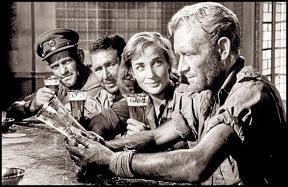
Anthony Quayle and friends drink a well-earned beer in ‘Ice Cold in Alex’.
Mrs Gurbardhi came down the steps of the house carrying her large, round, metal tray. She balanced it on the edge of the table and began to lift off the saucers of mezet she had prepared. There was white cheese, olives, a green salad, and some sliced liver fried with oregano.
“I have prepared some kukurec. Do you like it?” she said.
“I’d like to try it,” said Jude. She watched eagerly as Jude pushed his fork through a piece and put it in his mouth. It was a chewy, offal-like substance, which he did not take to. “I didn’t taste the like of it before,” he said having searched quickly for a phrase that would not offend. She nodded contentedly and went back up the steps.
“Did you bring one of those films for grandad Petrit?” said Shpetim.
“Yes… just pass me my bag,” said Jude. He lifted out his laptop and set it on the table top before rotating it to face Petrit. “It’s called ‘Ice Cold in Alex’. Anthony Quayle plays a South African soldier… in the Libyan Desert.” Jude placed a piece of white cheese in his mouth whilst he waited for the laptop to start up. He chose a scene where Quayle, John Mills and others were trying to push an old ambulance up a huge sand dune. Petrit leant in close to scrutinise it.
“Is it him?” said Shpetim eagerly. All eyes were on the old Partisan.
“I don’t know,” he said. “It’s been a lifetime since I saw him. We had walked all the day to get to the cave…”
“Yes, yes… We know the story,” interrupted Luan. “Look hard!” Petrit lifted his stick and jabbed at the screen. A smile began to form on his face.
“Will you look at that!” he said. “I remember… the eyes.” Jude sat back in his chair smiling. Shpetim laughed and put his hand on the old man’s shoulder.
“Go get your souvenirs!” said Shpetim.
Petrit shuffled back down the house steps ten minutes later with a frayed, brown envelope, which was passed to Jude. He lifted out a black and white publicity photo of Joan Fontaine. It was in good condition except for a diagonal tear from the top left corner halfway to the centre. He tipped the envelope sideways and a gold sovereign rolled into his palm. It was in near mint condition and had Queen Victoria’s head on it. Jude ran his thumb softly over its face.
“Where did you hide these… all those years?” said Jude thinking they could have cost him internment. Petrit touched his nose.
*As a footnote of interest, the cave, known as ‘Sea View’, actually existed as an SOE base, and Major Quayle was present in Albania as described in the scene.
Copyright Paul Alkazraji. Highland Books Ltd. 2012. All Rights Reserved.

http://www.amazon.co.uk/The-Silencer-...

Anthony Quayle and cast in ‘The Guns of Navarone’
Shpetim’s grandfather shuffled slowly down the steps and indicated with his stick that he wanted a cushion for the chair.
“How do you like Albania?” said Skender refilling his own glass with raki.
“I like it,” said Jude. “Great weather… great dust! Expensive Mercedes cars with roads to break their suspensions on. Warm, hospitable people living in cold apartment blocks… You are a family-loving people… providing you don’t get into a disagreement with another family.” There was an outburst of hearty laughter from all at the table.
Shpetim raised his glass. “Gëzuar!” he said.
“Gëzuar!” everyone toasted, chinking the tips of glasses together.
“Luan here broke the suspension on uncle Burim’s Mercedes,” said Shpetim gesturing to his side with his thumb.
“I did not. It was the axle… and it was already defective!” protested Luan and jumped up to grab his brother in a neck-lock. The two bothers play-wrestled with each other from the table across the yard until Shpetim took hold of Luan’s leg and up-ended him. They both tumbled together into a bush cracking the branches and rolling out together covered in twigs and leaves. Everyone roared with laughter. Shpetim’s immaculate, white shirt was now soiled and the front pocket torn.
“What about England? Don’t you miss it? Great Britain! It is a high culture Jude… and we will see it together, won’t we?” said Shpetim frowning at his brother as he brushed himself down.
“We will,” said Jude. “I miss it… and I worry about it. People call light darkness there now. I don’t know… it’s as if it’s lost its compass.”
“Old Petrit here… he loved the British officers when he was a boy,” said Shpetim.
“He was a child Partisan!” said Luan standing up and saluting with a clenched fist. “Vdekje fashizmit! Death to fascism! Freedom for the people!”
“Who did you meet, xhaxhi Petrit?” said Jude, his interest pricking up.
“Dëgjo…” said Petrit putting his stick against the table edge and lifting a piece of tomato to his mouth before sucking it noisily. He was not going to be rushed; he’d been given the spotlight.
“My family is from Dukat near Vlora… not here,” he said. “The war was terrible. I remember the Italian soldiers starving… they fell down at the roadsides together with their mules and died. There were some British officers who had a base in the mountains near us… some Italians would come and buy food for them from the villagers. One time, a big plane, a Halifaks they said, came in with supplies and more British soldiers and crashed into the mountain killing everyone on it. Some of the Partisans looted it… I was angry with them. It was not right. They had come to help us fight the Nazis!” He sat upright now and a boyish pride shone through his eyes. “But I went with my father… We took some bread, cheese and dried meat, and packed it in a bag on our mule. We travelled for most of the day through the mountains and down to the sea. The sun was setting across the Adriatic… all the way to Italy. The British had a base in a cave there… we knew. There was a man I remember… who came out to meet us. He had a fat face and small eyes. He looked sick and yellow… Major Toni Kueill he was called. He gave us a gold sovereign for the food. He gave me a photo of a film star and he said, “I’m sorry it is torn.” My father gave the sovereign to me and I still have it. Later, I joined the Partisans… that is another story.”
“If it was Major Anthony Quayle, xhaxhi, you met a special man. After the war, he became a famous film actor. Did none of you ever see him on the television?” Jude looked around at the blank faces. Luan shrugged his shoulders.
“’Ice Cold in Alex’… ‘The Guns of Navarone’… ‘Lawrence of Arabia’? I’ll get copies!” said Jude. “Enver Hoxha sent Partisans after the British officers who’d helped him as the war was drawing to a close. They were just a small band of men trying to fight off an evil tyranny… as another home-grown one moved in to take its place.”
“Enver Hoxha was a killer of the Albanian people!” shouted Luan and thumped the table.
“They were almost caught, but they escaped with their lives,” said Jude. “Those that died during those special operations, we know, are buried in Tirana Park.”
“It was a fight they lost,” said Skender. “It was obscure and far from the front lines. The war was won on the beaches of Normandy.”
“It’s sometimes said… that the victory over all evil was won at Calvary,” said Jude glancing at Shpetim. “That was our D Day. But we are in the days before VE Day… when He will come again. Until then… that battle is still on.”
From Chapter 14.

Anthony Quayle and friends drink a well-earned beer in ‘Ice Cold in Alex’.
Mrs Gurbardhi came down the steps of the house carrying her large, round, metal tray. She balanced it on the edge of the table and began to lift off the saucers of mezet she had prepared. There was white cheese, olives, a green salad, and some sliced liver fried with oregano.
“I have prepared some kukurec. Do you like it?” she said.
“I’d like to try it,” said Jude. She watched eagerly as Jude pushed his fork through a piece and put it in his mouth. It was a chewy, offal-like substance, which he did not take to. “I didn’t taste the like of it before,” he said having searched quickly for a phrase that would not offend. She nodded contentedly and went back up the steps.
“Did you bring one of those films for grandad Petrit?” said Shpetim.
“Yes… just pass me my bag,” said Jude. He lifted out his laptop and set it on the table top before rotating it to face Petrit. “It’s called ‘Ice Cold in Alex’. Anthony Quayle plays a South African soldier… in the Libyan Desert.” Jude placed a piece of white cheese in his mouth whilst he waited for the laptop to start up. He chose a scene where Quayle, John Mills and others were trying to push an old ambulance up a huge sand dune. Petrit leant in close to scrutinise it.
“Is it him?” said Shpetim eagerly. All eyes were on the old Partisan.
“I don’t know,” he said. “It’s been a lifetime since I saw him. We had walked all the day to get to the cave…”
“Yes, yes… We know the story,” interrupted Luan. “Look hard!” Petrit lifted his stick and jabbed at the screen. A smile began to form on his face.
“Will you look at that!” he said. “I remember… the eyes.” Jude sat back in his chair smiling. Shpetim laughed and put his hand on the old man’s shoulder.
“Go get your souvenirs!” said Shpetim.
Petrit shuffled back down the house steps ten minutes later with a frayed, brown envelope, which was passed to Jude. He lifted out a black and white publicity photo of Joan Fontaine. It was in good condition except for a diagonal tear from the top left corner halfway to the centre. He tipped the envelope sideways and a gold sovereign rolled into his palm. It was in near mint condition and had Queen Victoria’s head on it. Jude ran his thumb softly over its face.
“Where did you hide these… all those years?” said Jude thinking they could have cost him internment. Petrit touched his nose.
*As a footnote of interest, the cave, known as ‘Sea View’, actually existed as an SOE base, and Major Quayle was present in Albania as described in the scene.
Copyright Paul Alkazraji. Highland Books Ltd. 2012. All Rights Reserved.

http://www.amazon.co.uk/The-Silencer-...
Published on February 04, 2021 07:01
•
Tags:
albania, anthony-quayle, enver-hoxha, ice-cold-in-alex, john-mills, partisans, special-operations-executive, the-guns-of-navarone
January 22, 2021
'The Silencer' Reviewed
 The Silencer by Paul Alkazraji
The Silencer by Paul AlkazrajiMy rating: 4 of 5 stars

They said...
‘Paul Alkazraji's novel conveys a vivid and atmospheric impression of life in the Balkans. His characters are believable and real, some of them loveable and slightly eccentric. This is a thriller in the old style, building up a picture with skill and dexterity, and as the plot becomes tense towards the end of the book, it is a real page-turner. Highly recommended!!’
Grace Turner. Author of ‘The Kings Gold’, Monarch Books.
---
Great holiday read
‘I enjoyed this read while taking time out; it was easy to recognize the Balkan attitudes, the dangers in that area of the world, and the fundamentalist mindset. A great read for a journey or the beach, with a tea or a Raki.’
Ian Loring, subject of ‘Christ and the Kalashnikov’, Zondervan. Amazon.co.uk
---
Great story by a master creator of images
‘The Silencer does a wonderful job of bringing to life the culture, climate and topography of the Balkans, especially Turkey, Greece and Albania. I've been living in the Balkans myself for 24 years and I instantly recognized the place descriptions in Paul's book. And it's not a bad tale, either. Paul gives an excellent portrayal of Albanian culture, both its positive and negative aspects. He tells an inspiring story of selflessness, sacrifice, and love overcoming evil. Highly recommended.’
Dan Truitt. Amazon.co.uk
---
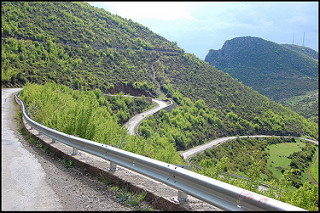
A gripping read from start to finish
‘The Silencer is a gripping, edge-of-your-seat thriller set in Albania and Turkey. It captures the atmosphere and characters of Albania very well, and the plot carries you along at a great pace. Full of suspense, I found it hard to put the book down. I rarely read books more than once but am about to read The Silencer again!’
Andrew Avramenko. Amazon.co.uk
---
‘Portraying faith in fiction is a major challenge. Believers tend to do it badly, and unbelievers find it hard to believe in! But faith is a huge part of life for millions of people... why shouldn't it surface in good-quality fiction? Paul Alkazraji's 'The silencer' is an excellent example of a whole new genre: stories that take faith seriously without seeking overtly to 'convert'. Faith-based without being faith-biased, The Silencer is a fast-moving tale that beautifully captures the landscapes and cultures of Albania. This is an author who has found a new home; has fallen in love with it, and is not afraid to let that love shape his writing. The book offers particular insight into the small but growing Albanian evangelical community: a faith-group that was officially non-existent until the Iron Curtain came down. The attempt to grow church in the nation once declared as the world's first fully atheist state; the pressures of corruption and opposition; the raw beauty of the place and its people - these are the threads that weave together to form this intriguing tale.’ This review also appears on my blog, lovethewords.com
Gerard Kelly, author.
---
A very Albanian murder
A Christian novel to be enjoyed at your leisure! This is a ‘who-dun-it’ set in Albania, and while the characters and the intrigue are completely fictional it is not difficult to understand how they could be so real in the political climate of the area. The blurb states that ‘mission is no Christian monopoly’ and as the story unfolds we see the ‘political’ and fanatical groups that endanger the work of the gospel today. A good, easy read for the lengthening evenings or a good stocking filler if this is the genre of books that you enjoy!
Val Maidstone, pastor’s wife from Dorking. Evangelicals Now, UK. November 2013.
---
‘The book is a fitting tribute to Berti (Dosti)... and thousands of other brave Albanian Christians whose testimonies helped the Church survive a difficult rebirth...” “...keeps the reader on a knife-edge until the final page.’
John Butterworth. Author of ‘God's Secret Listener’ reviewing for ‘Inspire’ UK.
---
A clear picture of the struggles, joys, and areas for prayer facing all missionaries…
‘First of all, let me say that if I was a missionary in Albania, I would want every one of my friends, family and supporters to read this book. It gives a clear picture of the struggles, joys, and areas for prayer facing all missionaries living and working with Albanians. It's done in an honest, but not sappy or overly-spiritualizing way, and I was so pleased to see such an excellent treatment of the realities of life there. It's given me new avenues for prayer. Well done.
We worked and lived in Eastern Europe and Russia for some years, so I'm familiar with a lot of the issues presented in the book. I love that it's fiction, so no one is 'implicated'. Yet, it gives the picture very clearly and without bias.’
Name withheld.
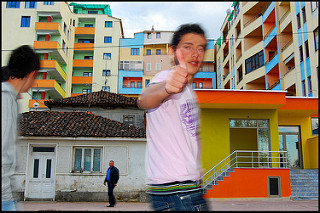
All photos. Peter Wilson.
View all my reviews
New by Paul Alkazraji.

January 7, 2021
Those dangerous mountain roads
Driving over the mountain roads in Albania recently, the tops dusted with fresh snow, reminds me of warmer days depicted in Chapter 1 of The Silencer, and evoked here in photographer Peter Wilson’s beautiful photo.
Chapter 1
South of Tirana, Albania.

Pic. P.Wilson.
Away to the west the view opened out before him. The ridgelines of mountains, light brown and then deep brown into shadow, rose beyond each other for over fifty kilometres fading into the blue haze. The sun was falling lower over them tingeing the dust with an orange-pink. Jude leant forwards to see and felt pleasure well up. There was an eruption of birdsong from beneath the old man’s jacket. He reached inside it methodically and Jude watched half-expecting him to draw out a canary in a protective caress. He lifted a mobile phone to his ear.
“Alo. I’m on the Krrabë road! What? Wait, I said. I’m coming!” he shouted. All eyes turned to glower at him. He sniffed and seemed oblivious to it.
Jude turned around to drink in the view through the rear window. A dark blue ‘90s Mercedes with a broken headlight was drawing up behind them. The van driver now began to accelerate as the road levelled out along the top of the ridge. He tapped out a cigarette from a pack on the dashboard and slipped it into the corner of his mouth, glanced in his side mirror, and squared himself at the wheel. The Mercedes pulled out to the left and began to draw alongside. A sign with white arrows on black indicating a sharp turn left was coming closer. An old, Chinese truck came rasping around the bend with its horn on. Jude tightened his grip a little on the seat in front. The Mercedes braked and swung back sharply in behind them. He could see a faint grin of pleasure on the van driver’s face in the rear-view mirror as he touched the lighter to his cigarette. He manoeuvred the gears upwards.
A line of pylons marched up the mountain’s flank and across the road ahead of them. In seconds, the wires few over their heads. A white stony riverbed snaked away on the valley floor, perhaps five kilometres away, the water catching the sun and flashing its message. The driver’s mobile phone rang with the Nokia tone and with one hand on the wheel he put it to his ear.
“E, mo!” he shouted. ”What’s up?” As they took the bend the van tires began to sing on the road surface. He dropped the phone and the cigarette into his lap and gripped the wheel. Jude ran his hand through his hair and felt his heart beat quicken. The driver began beating the burning tobacco off his lap.
“O, zoti Schumacher? Take it easy there!” Jude called to him. The youth turned around and grinned. The Mercedes pulled out to the left for another attempt to pass and began to pull up level. Jude looked down at the two men sitting in the front. Both wore clean, blue shirts and sunglasses. The passenger looked up at Jude, and then seemed to nod to his driver. The road swung to the left over a narrow bridge and the Mercedes was forced back again in behind the van beating on its horn.
Whitewashed, stone walls, holding back the mountain dirt behind them, streamed past stencilled with logos and sprayed with graffiti: ‘Albanian Exhausts’, ‘Geri’, ‘LSI’… Then came a café plastered with Nescafe posters, a man selling ice cream from a scratched refrigerator, and an old man bobbing sidesaddle on a mule laden with white sacks, flicking its rump with a stick. The old man in the cloth cap called something to the driver but he didn’t respond. Jude could feel touches of cold sweat on his palms. He took his glasses off and cleaned the condensation with his T-shirt.
“Lord, keep us on the road!” he prayed under his breath. He glanced backwards. The Mercedes was right up to the van’s bumper. It swung back to the left and pulled parallel, the driver hammering his horn. Then it touched the side with a metallic grate.
“Zot i madh! God!” shouted the driver, jerking his head to the left and back to the road ahead. The youth pressed his face to the glass angrily waving the car to pass. The road forced the Mercedes back.
Old concrete telegraph poles flashed past, tilted, fallen and then gaps, some with scraps of wire hanging down. Below them were short white posts topped with a red tip that looked to Jude like cigarette sweets. A policeman standing in a dirt lay-by vainly lifted his traffic lollipop and then stood back, hands on his hips and cap pushed back. Jude leant forward to see if he could catch the driver’s eye in the rear-view mirror. The speedometer was past 120 km/h…
From Chapter 11
With his cheek pressed deeply into the pillow Jude lay on his front. He could not get into a comfortable position. He reached for his mobile phone on the bedside cabinet and checked the time. It was 4.08am. He held its lit face over Alex and saw she was sleeping deeply. He slid it under the pillow and dropped his head. He thought about how the culture had worn her down as she tried to help the women economically as well as spiritually. His mind moved to Spiro: would Mehmed’s book be ready for the biennial conference? It drifted to Valon’s daughter, Kela, in Shënvogël and if the local doctors would really help her. He spun over and lay on his back. He heard a man singing drunkenly down in the stairwell, and somewhere the raised voices of a couple rowing. A taxi van rumbled down May 5th Street, hunting for passengers for its early morning Tirana run.
On the dressing table was a photo in a clip frame that Alex had taken of light shafts on the grey sea off the cliffs of Bournemouth, where her parents had run a bed and breakfast establishment. Streetlight came through a gap in the curtains and reflected off its glass surface giving a point for the eye to fix on. In that moment, the noises around seemed to fade down. The curtain fluttered by the open window. The particles of air seemed almost charged with something. Alex turned over and sat upright.
“Jude… I just had a dream,” she said breathily. “It was very vivid. Can you get me a glass of water?” Jude kicked off the sheet on his side and felt the floor with his feet for his slippers. He switched on the side lamp and watched Alex push herself back against the wall. She wiped her face with her hands, her magnified shadow moving against the orange glow on the wall. He felt his way through to the kitchen in the darkness and fumbled for a glass in the cupboard. He filled it from the tap and returned. He handed it to her and sat down on the edge of the bed. “So what was it?” he said.
“Wait,” she said. She was breathing heavily. She drank several gulps and then caught her breath. “There was a man trying to wrap himself in a flag… as the breeze seemed to lift it off him. It was a red one… but not the Albanian flag. It had a white crescent and a star on it.”
“It’s the Turkish flag,” said Jude.
“I also saw one of those blue glass ‘evil eye’ charms they sell in the market here. Only it was big, like a moon… and it was riding through the night as it passed over the lights of towns below it… Alexandroupoli, Xanthi…” She seemed to pause mid-sentence.
“Those are Greek towns,” he said.
“There was a man looking at a name on a computer screen… It was your name Jude.”
“The same man with the flag?”
“They had no clear form. I don’t know.” Jude ran his hand back through his hair. “And what do you make of it?” he said as he looked at her. She held her gaze forwards as if looking beyond their bedroom. She cast him an anxious glance sideways.
“Let me pray. That’s all I can recall of it,” she said. She lowered herself under the sheet and closed her eyes. Jude lay down on the bed beside her. He felt her reach for his hand and he slid it to her. He turned off the side lamp and looked up at the ceiling. He knew that God had used dreams to speak to Alex in the past. He remembered her ‘Clapham Junction’ dream when she came to faith, but what did this one mean? Did it mean anything at all? How on earth was he to know? When he fell asleep, before Alex, sometime around 5am, the dawn light had crept into the room.
From Chapter 27
Shpetim fastened the buttons of his white shirt, took his mobile phone and a slate grey suit jacket, and left the house immediately after Jude’s phone call. It was now urgent, he felt, to find and confront this Sheref Dushman. In a town of 30,000 people, he knew he could locate him given time, maybe not too much, unless he chanced upon him quickly. He decided he would check out the three main hotels, though he knew there were dozens more and some that didn’t even sign in their guests. He made some calls to local contacts. Then he walked repeatedly between Shënomadh County Police Directorate and the high street watching.
At 10.55am he took a phone call from his SHISH director ordering him to return to operations monitoring the civil disturbances. He rubbed his temples lightly with his thumb and middle finger. The consequences for him if he delayed would be very serious. He walked out into the centre of the high street and looked both ways searching. His phone vibrated in his hand. He took the call.
“Alo,” a man shouted. “Bledi Shehu jam. You came yesterday? My grandmother just told me. She’s not as she was… her legs, her ears, her head… you know.”
“Bledi… police. You brought a man up from the border on Tuesday morning. Where did you drop him?”
“Po. By the hotels on Rruga e Gështenjave… what’s wrong with that?”
“Nothing. I’ll be in touch.” Shpetim hung up. He looked down the high street to the top of the avenue of horse chestnut trees around 200 metres away. He began to jog towards it.
He turned the corner and ran on until he came to the side street. A woman in a white cleaner’s jacket sat on a chair outside the first hotel. He took out the folded print out with an enlarged, grainy passport photo of Sheref on it and showed it to her.
“I’m looking for this man. Have you seen him?” he said authoritatively.
“Yes… he checked out about two hours ago.”
“How did he seem to you?”
“He paid his bill… what can I say?” she shrugged. She smoothed back her tight, purple-black hair considering something. “He had strange eyes, though… when he took his sunglasses off… cold, cloudy… huh, like a fish left too long out of the water.” Shpetim stood thinking as he stared at her. She began to shuffle uneasily. Maybe he had just moved on to another town, he thought. Or maybe this is his final day?
He spun on the ball of his foot and walked back onto the avenue. He began to walk quickly past the trees as a wind started to churn their leaves. A shower of chestnuts drummed down onto the tarmac scattering as he crossed over. He jogged past the sliding doors of Banka Alpha where an LCD clock read 11.30 am. He lifted his phone to his ear and pressed a speed-dial option.
“Luan, can you get over to May 5th Street, Jude’s block,” he said. “Yes… I know Burim’s got the Mercedes!” He slung his jacket over his shoulder and the holstered pistol wrapped inside it thudded into his back as he moved. He jogged along the pavement of the main road clipping a café chair with his hip knocking it over. He stopped and ran back to pick it up apologising to an angry waiter. He jogged quicker now breaking into a run along the edge of the road.
Copyright Paul Alkazraji. Highland Books Ltd. 2012. All Rights Reserved.
http://www.amazon.co.uk/The-Silencer-...
Taken from:

Chapter 1
South of Tirana, Albania.

Pic. P.Wilson.
Away to the west the view opened out before him. The ridgelines of mountains, light brown and then deep brown into shadow, rose beyond each other for over fifty kilometres fading into the blue haze. The sun was falling lower over them tingeing the dust with an orange-pink. Jude leant forwards to see and felt pleasure well up. There was an eruption of birdsong from beneath the old man’s jacket. He reached inside it methodically and Jude watched half-expecting him to draw out a canary in a protective caress. He lifted a mobile phone to his ear.
“Alo. I’m on the Krrabë road! What? Wait, I said. I’m coming!” he shouted. All eyes turned to glower at him. He sniffed and seemed oblivious to it.
Jude turned around to drink in the view through the rear window. A dark blue ‘90s Mercedes with a broken headlight was drawing up behind them. The van driver now began to accelerate as the road levelled out along the top of the ridge. He tapped out a cigarette from a pack on the dashboard and slipped it into the corner of his mouth, glanced in his side mirror, and squared himself at the wheel. The Mercedes pulled out to the left and began to draw alongside. A sign with white arrows on black indicating a sharp turn left was coming closer. An old, Chinese truck came rasping around the bend with its horn on. Jude tightened his grip a little on the seat in front. The Mercedes braked and swung back sharply in behind them. He could see a faint grin of pleasure on the van driver’s face in the rear-view mirror as he touched the lighter to his cigarette. He manoeuvred the gears upwards.
A line of pylons marched up the mountain’s flank and across the road ahead of them. In seconds, the wires few over their heads. A white stony riverbed snaked away on the valley floor, perhaps five kilometres away, the water catching the sun and flashing its message. The driver’s mobile phone rang with the Nokia tone and with one hand on the wheel he put it to his ear.
“E, mo!” he shouted. ”What’s up?” As they took the bend the van tires began to sing on the road surface. He dropped the phone and the cigarette into his lap and gripped the wheel. Jude ran his hand through his hair and felt his heart beat quicken. The driver began beating the burning tobacco off his lap.
“O, zoti Schumacher? Take it easy there!” Jude called to him. The youth turned around and grinned. The Mercedes pulled out to the left for another attempt to pass and began to pull up level. Jude looked down at the two men sitting in the front. Both wore clean, blue shirts and sunglasses. The passenger looked up at Jude, and then seemed to nod to his driver. The road swung to the left over a narrow bridge and the Mercedes was forced back again in behind the van beating on its horn.
Whitewashed, stone walls, holding back the mountain dirt behind them, streamed past stencilled with logos and sprayed with graffiti: ‘Albanian Exhausts’, ‘Geri’, ‘LSI’… Then came a café plastered with Nescafe posters, a man selling ice cream from a scratched refrigerator, and an old man bobbing sidesaddle on a mule laden with white sacks, flicking its rump with a stick. The old man in the cloth cap called something to the driver but he didn’t respond. Jude could feel touches of cold sweat on his palms. He took his glasses off and cleaned the condensation with his T-shirt.
“Lord, keep us on the road!” he prayed under his breath. He glanced backwards. The Mercedes was right up to the van’s bumper. It swung back to the left and pulled parallel, the driver hammering his horn. Then it touched the side with a metallic grate.
“Zot i madh! God!” shouted the driver, jerking his head to the left and back to the road ahead. The youth pressed his face to the glass angrily waving the car to pass. The road forced the Mercedes back.
Old concrete telegraph poles flashed past, tilted, fallen and then gaps, some with scraps of wire hanging down. Below them were short white posts topped with a red tip that looked to Jude like cigarette sweets. A policeman standing in a dirt lay-by vainly lifted his traffic lollipop and then stood back, hands on his hips and cap pushed back. Jude leant forward to see if he could catch the driver’s eye in the rear-view mirror. The speedometer was past 120 km/h…
From Chapter 11
With his cheek pressed deeply into the pillow Jude lay on his front. He could not get into a comfortable position. He reached for his mobile phone on the bedside cabinet and checked the time. It was 4.08am. He held its lit face over Alex and saw she was sleeping deeply. He slid it under the pillow and dropped his head. He thought about how the culture had worn her down as she tried to help the women economically as well as spiritually. His mind moved to Spiro: would Mehmed’s book be ready for the biennial conference? It drifted to Valon’s daughter, Kela, in Shënvogël and if the local doctors would really help her. He spun over and lay on his back. He heard a man singing drunkenly down in the stairwell, and somewhere the raised voices of a couple rowing. A taxi van rumbled down May 5th Street, hunting for passengers for its early morning Tirana run.
On the dressing table was a photo in a clip frame that Alex had taken of light shafts on the grey sea off the cliffs of Bournemouth, where her parents had run a bed and breakfast establishment. Streetlight came through a gap in the curtains and reflected off its glass surface giving a point for the eye to fix on. In that moment, the noises around seemed to fade down. The curtain fluttered by the open window. The particles of air seemed almost charged with something. Alex turned over and sat upright.
“Jude… I just had a dream,” she said breathily. “It was very vivid. Can you get me a glass of water?” Jude kicked off the sheet on his side and felt the floor with his feet for his slippers. He switched on the side lamp and watched Alex push herself back against the wall. She wiped her face with her hands, her magnified shadow moving against the orange glow on the wall. He felt his way through to the kitchen in the darkness and fumbled for a glass in the cupboard. He filled it from the tap and returned. He handed it to her and sat down on the edge of the bed. “So what was it?” he said.
“Wait,” she said. She was breathing heavily. She drank several gulps and then caught her breath. “There was a man trying to wrap himself in a flag… as the breeze seemed to lift it off him. It was a red one… but not the Albanian flag. It had a white crescent and a star on it.”
“It’s the Turkish flag,” said Jude.
“I also saw one of those blue glass ‘evil eye’ charms they sell in the market here. Only it was big, like a moon… and it was riding through the night as it passed over the lights of towns below it… Alexandroupoli, Xanthi…” She seemed to pause mid-sentence.
“Those are Greek towns,” he said.
“There was a man looking at a name on a computer screen… It was your name Jude.”
“The same man with the flag?”
“They had no clear form. I don’t know.” Jude ran his hand back through his hair. “And what do you make of it?” he said as he looked at her. She held her gaze forwards as if looking beyond their bedroom. She cast him an anxious glance sideways.
“Let me pray. That’s all I can recall of it,” she said. She lowered herself under the sheet and closed her eyes. Jude lay down on the bed beside her. He felt her reach for his hand and he slid it to her. He turned off the side lamp and looked up at the ceiling. He knew that God had used dreams to speak to Alex in the past. He remembered her ‘Clapham Junction’ dream when she came to faith, but what did this one mean? Did it mean anything at all? How on earth was he to know? When he fell asleep, before Alex, sometime around 5am, the dawn light had crept into the room.
From Chapter 27
Shpetim fastened the buttons of his white shirt, took his mobile phone and a slate grey suit jacket, and left the house immediately after Jude’s phone call. It was now urgent, he felt, to find and confront this Sheref Dushman. In a town of 30,000 people, he knew he could locate him given time, maybe not too much, unless he chanced upon him quickly. He decided he would check out the three main hotels, though he knew there were dozens more and some that didn’t even sign in their guests. He made some calls to local contacts. Then he walked repeatedly between Shënomadh County Police Directorate and the high street watching.
At 10.55am he took a phone call from his SHISH director ordering him to return to operations monitoring the civil disturbances. He rubbed his temples lightly with his thumb and middle finger. The consequences for him if he delayed would be very serious. He walked out into the centre of the high street and looked both ways searching. His phone vibrated in his hand. He took the call.
“Alo,” a man shouted. “Bledi Shehu jam. You came yesterday? My grandmother just told me. She’s not as she was… her legs, her ears, her head… you know.”
“Bledi… police. You brought a man up from the border on Tuesday morning. Where did you drop him?”
“Po. By the hotels on Rruga e Gështenjave… what’s wrong with that?”
“Nothing. I’ll be in touch.” Shpetim hung up. He looked down the high street to the top of the avenue of horse chestnut trees around 200 metres away. He began to jog towards it.
He turned the corner and ran on until he came to the side street. A woman in a white cleaner’s jacket sat on a chair outside the first hotel. He took out the folded print out with an enlarged, grainy passport photo of Sheref on it and showed it to her.
“I’m looking for this man. Have you seen him?” he said authoritatively.
“Yes… he checked out about two hours ago.”
“How did he seem to you?”
“He paid his bill… what can I say?” she shrugged. She smoothed back her tight, purple-black hair considering something. “He had strange eyes, though… when he took his sunglasses off… cold, cloudy… huh, like a fish left too long out of the water.” Shpetim stood thinking as he stared at her. She began to shuffle uneasily. Maybe he had just moved on to another town, he thought. Or maybe this is his final day?
He spun on the ball of his foot and walked back onto the avenue. He began to walk quickly past the trees as a wind started to churn their leaves. A shower of chestnuts drummed down onto the tarmac scattering as he crossed over. He jogged past the sliding doors of Banka Alpha where an LCD clock read 11.30 am. He lifted his phone to his ear and pressed a speed-dial option.
“Luan, can you get over to May 5th Street, Jude’s block,” he said. “Yes… I know Burim’s got the Mercedes!” He slung his jacket over his shoulder and the holstered pistol wrapped inside it thudded into his back as he moved. He jogged along the pavement of the main road clipping a café chair with his hip knocking it over. He stopped and ran back to pick it up apologising to an angry waiter. He jogged quicker now breaking into a run along the edge of the road.
Copyright Paul Alkazraji. Highland Books Ltd. 2012. All Rights Reserved.
http://www.amazon.co.uk/The-Silencer-...
Taken from:

December 3, 2020
Easy Listening...

Radio Days.
Where is Albania... exactly? Is there religious tolerance now in ‘the world’s first atheist state’? How did the economic crisis in Greece affect its people? Grab a latte or espresso, put your feet up and listen in for a few minutes to one of these radio recordings :)
Chatting on...
'Trans World Radio' about the Greek Debt Crisis and migration from Albania...
https://www.mixcloud.com/Muthena/gree...
'United Christian Broadcasters' on the Paul Hammond Show about Albania's history and the church in the country...
https://www.mixcloud.com/Muthena/pope...
'Branch FM' about a Yorkshire childhood, journalism and finding faith in Jesus… https://audiomack.com/artist/paul-alk...
By this author:

Published on December 03, 2020 08:54
•
Tags:
albania, greek-debt-crisis, journalism, migration, the-church, yorkshire
November 19, 2020
'The Migrant' Novel - Q and A
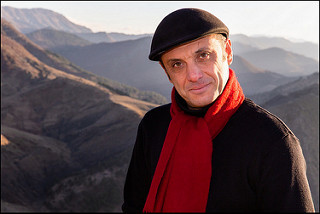
The author Paul Alkazraji in the Albanian mountains
close to the border with Greece. Pic: Andrew LaSavio.

Where does the story begin?
In the spectacular forested mountains bordering Albania and Greece, close to Little Prespa Lake, at dusk. A young Albanian man, Alban, and his friend, sneak past a watchtower to enter Greece illegally in search of work, but they are spotted by a border guard and a chase to catch them begins.
What is the story about?
It is about a pastor, Jude Kilburn, who takes on the responsibility to care enough for another person in his village, the young man, Alban, that he is ready to go the extra kilometre, over 500 of them in fact, to Athens to see if he is safe.
What happens in Athens?
Jude arrives in the Greek capital as dangers all around Alban are building - violent anti-austerity riots, the rise of far right political groups and racist attacks, the clutches of a trafficking gang, and a cynical police operation - then races against time to find him.
Did you personally make the journey in the story from Albania to Athens?
Yes, I drove down through Greece myself in an old Mercedes with two companions to experience the sights and sounds of the country, past Mount Olympus and Delphi. I then spent time in central Athens, in Plaka and Exarcheia, so I could evoke a keen sense of time and place as a backdrop.
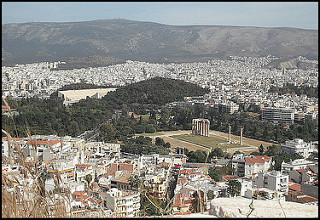
The view across Athens from the Acropolis.
What inspired you to write it?
I have worked for some years in Albania, and seen first-hand the struggles and risks many Albanians face to escape poverty and unemployment and find work abroad. It is, in a way, their story I am telling.
What are its themes?
It deals with people searching for a better life, without poverty or violent conflict, with migrants of the recent mass-movements up through southern Europe, and with dreams that turn sour. It deals too with where our final hope lies for finding such a destination of prosperity and peace.
Do you have a favourite scene from the book?
There are scenes on the Acropolis and in the middle of a riot in Syntagma Square and more that I hope are vivid enough to immerse the reader totally in energy of the moment.
Do you have a favourite minor character?
Some of them would be ‘Che’ Chaconas the anarchist, Granit Korabi the criminal gang member, and Stavros ‘The Big Man’ and Neo-Hellenic Front member. But the protagonist, Jude, the pastor who takes on the search for Alban, has more of my personal empathy.
Do you have a favourite sentence from the book?
The life of the poet Lord Byron has parallels with Alban’s life, and I have quoted him a few times. This one from ‘Don Juan’ is a favourite: ‘Between two worlds life hovers like a star, twixt night and morn, upon the horizon's verge.’ It sums up the story.
Can we guess the ending?
There is a kind of justice in what happens in the epilogue. Originally, it wasn’t planned that way, so I didn’t! The scene was added later. But maybe you will guess it?
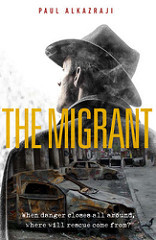
Amazon links to 'The Migrant':
UK: https://www.amazon.co.uk/Migrant-Paul...
US: https://www.amazon.com/gp/product/B07...



